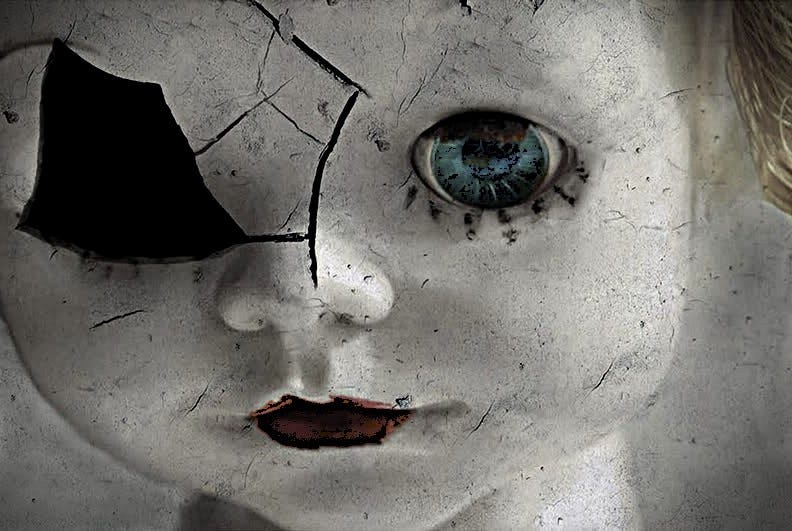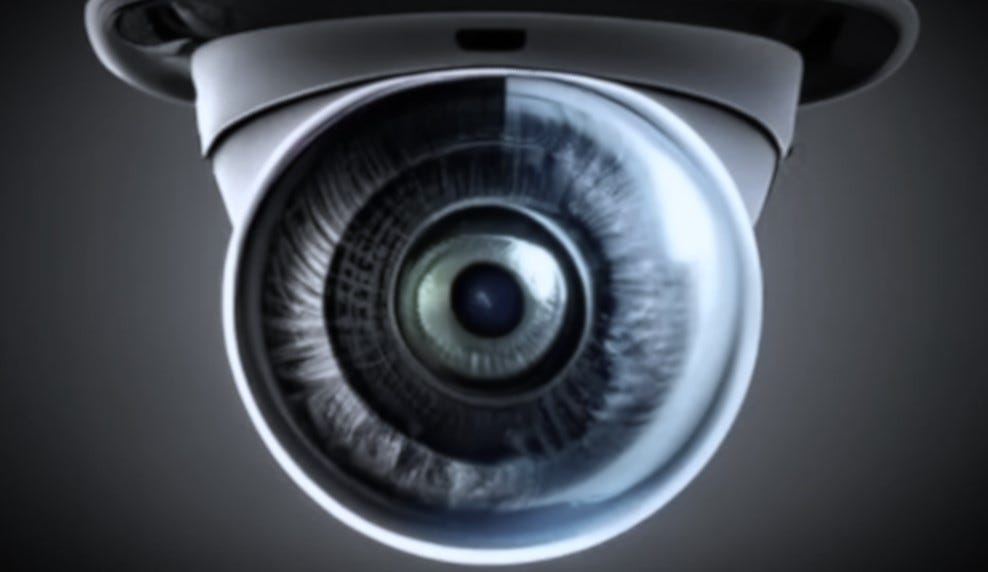The space where something should be
Short horror fiction for the Friday 13th EyeSee event
It shouldn't be possible to pluck out someone's eye, a living person's eye. Try it: insert your fingertips into your eye socket and press them firmly in around the edges of the eyeball. You couldn't possibly squeeze them into that tiny space, could you? And then to pull that eyeball, to tug it out, pull against the elastic tension of the muscles and the retention of the optic nerve? Impossible.
And yet that's exactly what Devereaux did that evening as Yardley lay on the lawn. She'd been warned: don't let yourself get all drunk and helpless with a strange guy. You know, he might get handsy or worse. In this particular case he got worse.
But he'd seemed all charming and trustworthy. You know, with his rich warm voice and his twinkling eyes and that friendly confident laugh that he's got. He clenched his square dimpled jaw as he pulled with his right hand. With his left hand he pressed down on Yardley's forehead, so that he could get good purchase on the right ocular orbit without her head jeking up.
The College Summer Graduation Ball went on. Strands of fairylights dangled and danced between the trees on the college green. Over by the haybale stage, tuxedoed boys and girls in rented ballgowns wa-watusied and frugged away the moonlit night to the retro sound of garage rock. But here on this patch of lawn everything was still, except for Deveraux's soft rhythmic gasping.
He had good purchase. She remained quite still as the eye slid out.
Had he slipped something into her drink? Perhaps. Mere drunkneness alone couldn't account for her complete unresponsiveness at this time. Devereaux slipped a switchblade out of his tux pocket. He whispered to himself the line His vorpal blade went snickersnack — ever the enthusiast of Lewis Carroll’s Looking-Glass world — as he severed the optic nerve, freeing the eyeball from its prisonhouse of the body.
And with that he was done.
It was remarkably easy for Devereaux to avoid all the consequences. You'd be surprised. He'd chosen his victim well: Yardley didn't even report the loss of her eye until much later the next day. She'd woken up with a terrible headache, went back to her dorm room to recuperate, and didn't even notice the loss of her eye until evening. By that time many of the attendees at the ball had left the leafy college town never to return. She had no clear memory of the night, none at all of who she was with.
They say there's no such thing as a perfect crime, but was easy for Devereaux to get away with this. You'd be surprised - or maybe not, you seem like someone who's been around the block some, who knows the way of the world in these matters. You know Devereaux, so you know what he can get away with.
Yardley's life was marked by the event, as you'd probably imagine. Sure, she was able to get a rather convincing prosthetic eye — how do they get those things in, into that limited space? she'd wondered to herself when it was suggested — but then she found out. Sure, she had some lackdsadaisical trauma counseling thereafter. On the house, on the College Student Compensatory Fund, who were not even convinced they had any liability in this case. Nevertheless, they signed an agreement, without admitting responsibility of course, but offering to fund a budget course for Yardley.
Therapist gazing out the window, gazing out into the blue, his eyes fixed on wheeling birds flying high, not really listening but saying uh-huh uh-huh as Yardley stammered out her unheard fears and dead disregarded dreams.
She moved on, but didn't really. She'd never move on really. Her college grades on graduation day, the day before the incident, hadn't been so good, but academic stuff had never been her strength. She'd imagined her strength was her intuition, her insight, so she'd planned her future around something that foregrounded an instinct for seeing the movements beneath the surface of things: market trader or poet, diviner of cards or social media consultant.
But it turned out she hadn't had that much insight after all. It marked her. She lost confidence, and we know that those lacking confidence are quite invisible to the bustling world. They don't stand out very much to the roaming eye, and they drift into the slight spaces between. She drifted off with them, and here we lose sight of what became of her in the end.
Imagine what ending you will: overdosing in a beat romantic garret with a busted guitar on the floor, hitching her way to Damascus in search of the epiphany of jihad, sucked up into the escstatic vision of a cult mass suicide. The genre of the lost is an open one, and the destiny of the forlorn is a blank slate, determined only by the imaginations of those who care enough to think of them for just a moment. Look into the crystal ball of your indifference and imagine you even care about what happened to her. Then envision the end you wish, and it will be so.
But Devereaux - oh you know Devereaux. He's irrepressible, thrusting, self-starting. His ambition starts at the stars and moves on from there. A friend to celebrities, advisor to statesmen, employer of multitudes, dreamer of impossible dreams. He's still a young man, or at least not old, and his added something has given him the edge. A visionary, they say. A man of foresight with his eye on both commercial opportunities and a glittering future for the human race.
Here he is now, sitting on a stage in front of an adoring crowd, being questioned by a pleasant young journalist - rather like Yardley was in her day, rather like all of the mothers to Devereaux's many children. A sprightly young woman, full of the desire to be agreeable and make everything go smoothly, a promising up-and-comer.
Was there any one moment that inspired you, that gave you the vision you needed to take you through all the difficulties to where you are now? Tell us your story...
That's a very interesting question, uh, Helen. In fact there was. There was a moment when I did something that I thought to be impossible, that if you even imagine it, you can't see how it could be done. But, I, uh, I did it.
How fascinating! Could you tell us more?
The details aren't really so important. What's important is that I came away from that experience with two insights: that what we imagine is impossible isn't really, because anything you can imagine can be done — and that before doing something you have to see it, see yourself seeing it and see youself carrying it out.
He relaxes quite visibly now. He has the young journalist and the audience at his feet gazing at him with anticipation. All their breaths are drawn in, held in. For him. His scant doubts have melted away. He's going to share with them.
It was at that moment I had the vision that later became iSee Inc. I was looking into a single eye, and it was looking at me. And I felt seen. And I realized then, uh, Helen, that we all want to be seen. So I set up a company, an app, in which people could be seen, all their habits, all their goals, all their hopes and dreams. People love being seen, they don't want to be ignored, they want to be watched over.
So he stands up, spreads his arms wide now. It's the kind of expansive gesture that his public loves. The pleasant young journalist coos audibly with delight, the audience at his feet follow his movements with exactitude, their eyes tracking his slightly jerky progress across the stage.
So iSee became the eye watching all of you. I was the one watching you and you watched me. Others paid me to watch you, but that wasn't the point. It was that we were all seen. One great big eye in the sky, and all of us watched over by machines of loving grace.
The audience applauds and calls out their adoration. Some stand up, and the others, because they can't see him if they stay sitting, stand up too.
He puts a hand to his heart and casts out his love to them because they see what he's doing. A little stiff, a little jerky, but not like that... you know, not that. You understand what he means, he means it with affection. You know Devereaux.
He thinks about the jar in his closet, in his special private closet, the closet he himself keeps clean and nobody knows about, at home. How the regard starts there, the adoring gaze, and emanates out from there, how it spreads all around the world to fill it all, fill all the world.
Now the audience — all those eyes there, fixed on him, on Devereaux. He does a little modest bow. And with that he is done.
========== [ The space where something should be | END ] ==========





